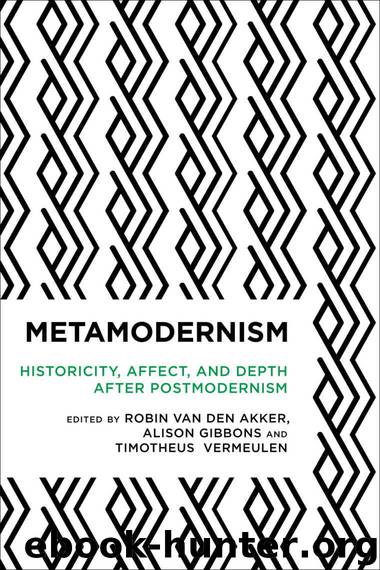Metamodernism: Historicity, Affect, and Depth after Postmodernism (Radical Cultural Studies) by Robin van den Akker & Alison Gibbons & Timotheus Vermeulen

Author:Robin van den Akker & Alison Gibbons & Timotheus Vermeulen
Language: eng
Format: epub
ISBN: 9781783489626
Publisher: Rowman & Littlefield International
Published: 2017-11-28T23:00:00+00:00
Chapter 8
Contemporary Autofiction and Metamodern Affect
Alison Gibbons
Writing in 2009, Mortimer somewhat colloquially and somewhat polemically proclaims, ‘Autofiction is front and center right now and shows no sign of giving up its ostentatious primacy’ (2009, 22). Similarly, Rak speaks of the so-called memoir boom, which she ties to ‘a period spanning roughly the first decade of the twenty-first century’ (2013, 3). The contemporary trend for and upsurge in life writing can be read in two ways. On one hand, such works might be considered to inflate the self and magnify individualism (see Benn Michaels 2013). In this construal, the boom of life writing feeds into what Pine and Gilmore (2011 [1999]) have termed the experience economy, in which personal experience is a precious commodity and prized marketing tool. From this, it follows that the very notion of subjectivity is co-opted as an instrument of late capitalism (and by extension, of a neoliberal postmodernism) with the consequence that the signifying potential of personal experience, emotion and subjective identity is eroded into a constructed, commercial fabrication.
This reading, however, disappoints on three counts. First, it is based on the inevitable prevalence of the self rather than on the particularities of self-construction in contemporary life writing. Neglecting the latter means that all cases of life writing are seen as vanity projects, irrespective of content or historico-cultural grounding. Second, reading life writing as a major form of postmodern individualism prioritises the writing subject at the expense of readers. Benn Michaels, for instance, suggests that reading memoir is motivated not so much by a desire for ‘the truth of what happened as the right attitude toward that truth’ (2013, 922). That is, readers want to be told how they should feel about an event – ethically, socially, politically – in place of authentically feeling. Both the first and the second shortcomings fuel a postmodern account of subjectivity in which hermeneutic emotion is unfeasible and any claims to truth-value or ethico-political sentiment are worthless since they are seen to unavoidably produce a form of reality-kitsch which functions merely as self-aggrandisement.
Third and finally, the argument overlooks a contemporary shift in what Jameson calls ‘emotional ground tone’ (1991 [1984], 6): here, a shift from postmodern senses of ending to a ‘structure of feeling’ (Williams 1979) in which the interrelating axes of historicity, affect and depth reverberate once again in meaningful ways. This chapter pursues this alternative reading of contemporary autofiction by connecting the prosperity of the genre to metamodernism as a cultural dominant. In doing so, I am treading somewhat contested ground; the autobiographical mode has been inherently equated with postmodern, poststructuralist concerns, namely the fragmentation of the subject and the blurring of ontological boundaries between fact and fiction (cf. Gilmore 1994; Garber 1996; Gudmundsdóttir 2003; Saunders 2010). I contend that while contemporary autofiction incorporates stylistic tropes of postmodernism, it nevertheless departs from postmodernism’s self-serving logic. To demonstrate this departure, I analyse two case studies, namely, Chris Kraus’s (2006 [1998]) I Love Dick and Frédéric Beigbeder’s (2004) Windows on the World.
Download
This site does not store any files on its server. We only index and link to content provided by other sites. Please contact the content providers to delete copyright contents if any and email us, we'll remove relevant links or contents immediately.
| Ancient & Classical | Arthurian Romance |
| Beat Generation | Feminist |
| Gothic & Romantic | LGBT |
| Medieval | Modern |
| Modernism | Postmodernism |
| Renaissance | Shakespeare |
| Surrealism | Victorian |
4 3 2 1: A Novel by Paul Auster(11050)
The handmaid's tale by Margaret Atwood(6853)
Giovanni's Room by James Baldwin(5878)
Big Magic: Creative Living Beyond Fear by Elizabeth Gilbert(4723)
Asking the Right Questions: A Guide to Critical Thinking by M. Neil Browne & Stuart M. Keeley(4576)
On Writing A Memoir of the Craft by Stephen King(4214)
Ego Is the Enemy by Ryan Holiday(3991)
Ken Follett - World without end by Ken Follett(3972)
The Body: A Guide for Occupants by Bill Bryson(3802)
Bluets by Maggie Nelson(3711)
Adulting by Kelly Williams Brown(3671)
Guilty Pleasures by Laurell K Hamilton(3587)
Eat That Frog! by Brian Tracy(3514)
White Noise - A Novel by Don DeLillo(3436)
The Poetry of Pablo Neruda by Pablo Neruda(3367)
Alive: The Story of the Andes Survivors by Piers Paul Read(3311)
The Bookshop by Penelope Fitzgerald(3227)
The Book of Joy by Dalai Lama(3218)
Fingerprints of the Gods by Graham Hancock(3213)
